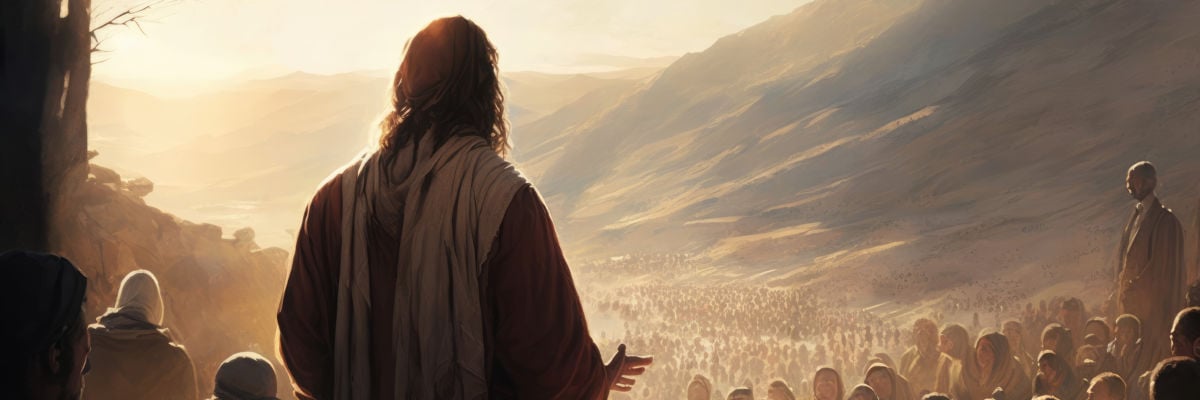
Episode 35: Year A – 16th Sunday of Ordinary Time
In this episode of the Sunday Catholic Word, we focus solely on Jesus’ parable of the Weeds Among the Wheat found in the Gospel reading for this upcoming 16th Sunday of Ordinary Time, Year A, which is taken from Matthew 13:24-30, and 36-43. There are two apologetical topics that this parable gives us opportunity to focus on: the reality of Hell and the problem of evil.
Looking for Sunday Catholic Word Merchandise? Look no further! https://shop.catholic.com/catholic-answers-merchandise/?q=sunday
Hey everyone,
Welcome to The Sunday Catholic Word, a podcast where we reflect on the upcoming Sunday Mass readings and pick out the details that are relevant for explaining and defending our Catholic faith.
I’m Karlo Broussard, staff apologist and speaker for Catholic Answers, and the host for this podcast.
In this episode, we’re going to focus solely on Jesus’ parable of the Weeds Among the Wheat in the Gospel reading, which is taken from Matthew 13:24-30, and 36-43. There are two apologetical topics that this parable gives us opportunity to focus on: the reality of Hell and the problem of evil.
I’m not going to read the parable in its entirety. Rather, I’ll highlight the specific verses that are relevant to our topics.
Let’s start with the details of the parable that relate to the reality of Hell.
After stating that there exist weeds that grow along the wheat within the Kingdom of God, Jesus says,
Let them grow together until harvest; then at harvest time I will say to the harvesters, ‘First collect the weeds and tie them in bundles for burning; but gather the wheat into my barn’ (v.30).
Then, in explaining the parable, Jesus comments,
The harvest is the end of the age, and the harvesters are angels. Just as weeds are collected and burned up with fire, so will it be at the end of the age. The Son of Man will send his angels, and they will collect out of his kingdom all who cause others to sin and all evildoers. They will throw them into the fiery furnace, where there will be wailing and grinding of teeth.
Now, there are a couple of details here that suggests the reality of Hell. One might think Jesus’ statement about the evildoers being thrown into the fiery furnace where there will be wailing and grinding of teeth is a slam dunk for proving the reality of Hell. But someone might counter and say that this could refer to temporary—something akin to purgatorial pains, not the eternal suffering of Hell.
I think there are two details that we can appeal to in response. First, notice that the weeds—those who cause others to sin and all evildoers—will be “collected out of [the Lord’s] kingdom” and “thrown into the fiery furnace.”
To be “out of the kingdom” cannot be a reference to something akin to purgatory because those who are in purgatory are in the kingdom. So, if we interpret this separateness as definitive, then the evildoers are in Hell.
Now, someone, like a universalist, might challenge the definitive nature of the evildoers being separated. Perhaps these evildoers, so the argument might go, are only temporarily separated from the kingdom, like a Christian who is temporarily separated from the kingdom when he commits mortal sin but then is restored through the Sacrament of Confession.
In response, there is nothing in the text that suggests those who are taken out of the kingdom are put back in. In fact, the flow of the narrative suggests that the “being taken out” is permanent. The whole parable is about the weeds existing alongside the wheat for a time and then eventually separated from the wheat and put into separate places. The parable wouldn’t make sense if Jesus intended the separated weeds to eventually be put back alongside the wheat.
“But,” someone might counter, “you’re assuming that the weeds stay weeds. A universalist could argue that the weeds eventually become wheat due to God’s grace.” Again, there is nothing in the text to suggest that. Nowhere does the text say anything to suggest that the weeds become wheat.
Since there is no evidence that the weeds are changed into wheat and thus put back into the kingdom, we are justified in interpreting Jesus’ parable according to its natural sense—namely, those who cause others to sin and evildoers will be definitively separated from the Kingdom of God. That’s a state of existence that we call Hell.
There’s another detail that suggests the reality of Hell: the binding or tying of the weeds into bundles (v.30). St. Thomas Aquinas picks up on this in his Commentary on the Gospel of Matthew.
He argues that this is the same imagery used in Matthew 22:13 where the man who didn’t have his wedding garment for the Wedding Feast is “bound” and cast out from the wedding feast. The same Greek word, deo—“to bind” or “to tie,” is used. In this parable, it is clear that the bound man is excluded from the Wedding Feast in a definitive way. Jesus says, “Many have been called but few have been chosen.” This implies that some will not participate in the Wedding Feast. Given that the Wedding Feast is an image for Heaven, it follows that some will not be chosen for Heaven.
Like the bound man who is permanently excluded from the wedding feast, the weeds that are bound in Jesus’ parable of the Weeds and the Wheat will be permanently excluded from the barn. Given that the barn is an image for Heaven, like the Wedding the Feast, it follows that the weeds, or the evildoers, will be permanently excluded from Heaven. That’s a revelation of Hell.
The next topic is the problem of evil. The detail that’s relevant to this topic is Jesus’ teaching to allow the weeds to grow up alongside the wheat. Given that the weeds symbolize those who cause others to sin and evildoers, this is a direct revelation that God wills to permit evil to exist alongside the good in this order of providence. This raises the question: “Why?”
St. Thomas Aquinas, again, in his Commentary on the Gospel of Matthew, he gives four reasons why “evil men should not be wiped out for the sake of good men.”
First, Aquinas writes, “good men are exercised by the evil.” In other words, good men themselves are sharpened in goodness by the evil experienced. Also, their goodness is manifested.
Aquinas quotes 1 Corinthians 11:19 where Paul says, “for there must be factions among you in order that those who are genuine among you may be recognized.” He also quotes Proverbs 11:29, which states, “the fool shall serve the wise.” To illustrate this principle, Aquinas gives the example of the knowledge of the saints. He argues, “If there had not been heretics, the knowledge of the saints, of Augustine and others, would not have shone forth.” This being the case, Aquinas concludes, “Hence he who would wipe out evil men would wipe out many good things as well.”
The second reason Aquinas gives for why “evil men should not be wiped out for the sake of good men” is that sometimes a person is evil for a while eventually becomes good. Aquinas gives the example of Paul, arguing, “if Paul had been killed, we would lack the teaching of so great a master.” Again, much good would be wiped out if evil men would be wiped out.
A third reason is because “some men seem evil and are not.” Aquinas doesn’t elaborate on this. But perhaps what’s behind this is the Church’s teaching that someone can commit an objectively grave evil act and yet not be guilty of mortal sin, assuming that either full knowledge or deliberate consent is lacking. In this scenario, the individual, in reality, wouldn’t be one of the evildoers who is bound and excluded from the wheat in the barn, although it might look as if he should.
This line of reasoning fits with the quote from 1 Corinthians 4:5 that Aquinas uses to end his thoughts on this reason, where Paul says, “Therefore do not pronounce judgment before the time, before the Lord comes, who will bring to light the things now hidden in darkness and will disclose the purposes of the heart.” The point here is that if the harvester were to get rid of all that he thinks is weeds, he may end up getting rid of some wheat.
Now, someone might counter, “This line of reasoning might apply to a creature wiping evil men out. But it wouldn’t apply to God since God would know who is not guilty of mortal sin.” I must admit that this is a fair challenge to this line of reasoning, since within the context Aquinas does seem to give these reasons as to why God permits the evil to exist along with the good. Right before he lists the reasons, he writes, “[T]he Lord puts up with many evils that many goods might come, or also lest they perish.”
So, if we apply this line of reasoning to God, I don’t think it works. However, if it applies to human authorities, then I think the line of reasoning would apply.
The fourth reason Aquinas gives is that “sometimes someone has great power; so if he were cut off, he would drag many with him, and thus with the evil man many would perish.” It’s hard to know exactly what Aquinas is getting at here. He gives the example of a congregation not being excommunicated with their priest, or a people not being excommunicated with their prince. But that’s not much help. Does he mean that if a bad powerful man is wiped out, his fellow bad men would not have a chance to repent? If so, then that’s the same as the second reason that he gave. Does he mean that if a bad powerful man is wiped out, generally good people might feel sorry for the bad man being wiped out and adopt his evil ways? I admit I’m not exactly sure.
But at least we can say that if all evil were wiped out, many good things, including good people, would be wiped out as well. And that’s something we can run with. In fact, that’s our Lord’s explanation. To the question of whether the weeds should be pulled, Jesus answers, “[I]f you pull up the weeds you might uproot the wheat along with them” (v.29).
Conclusion
Well, the Gospel reading for this upcoming 16th Sunday of Ordinary Time, Year A, gives us an opportunity to reflect on two important topics:
- The Reality of Hell, and
- The problem of evil.
As always, I want to thank you for subscribing to the podcast. And please be sure to tell your friends about it and invite them to subscribe as well. Also, if you’re interested in getting some cool mugs and stickers with my logo, “Mr. Sunday podcast,” go to shop.catholic.com.
I hope you have a blessed 16th Sunday of Ordinary Time. God Bless!



